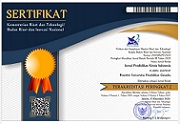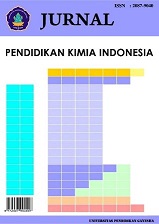The Effect of Online Learning on Learning Interest and Concepts Understanding During the Covid-19 Pandemic
DOI:
https://doi.org/10.23887/jpki.v6i2.49589Kata Kunci:
Online learning, Learning ability, Learning outcomes, Learning interestAbstrak
The Covid-19 pandemic caused a transformation in the implementation of learning from offline/face to face to online learning. This study aims to analyze the effect of online learning methods on students' learning interest during the Covid-19 pandemic. Online learning is very beneficial for maintaining learning communication between teachers and students. This research is based on the one-group pretest-posttest method. Where the initial ability of students is obtained through the Pretest before the lecture, and student learning outcomes are obtained from the Posttest which is carried out after the lecture using the online method. The research was conducted on 21 students who took acid-base chemistry courses. The data analysis technique used is simple linear regression analysis. From the research results, it was found that the average score of students in the Pretest was 59.5 and the average score of students in the Posttest was 74. Meanwhile, the response results showed that online learning methods had a positive, although not significant, effect on students' interest in learning during the Covid-19 pandemic. This means that the better the quality of online learning, the higher the learning interest of students. The magnitude of the influence of online learning methods on students' learning interest is only 3.8%. That means that even though it is not significant, the lecturer's ability to carry out online learning methods still has an influence on students' interest in learning.
Referensi
Antara, I. G. W. S., & Dewantara, K. A. K. (2022). E-Scrapbook: The Needs of HOTS Oriented Digital Learning Media in Elementary Schools. Journal for Lesson and Learning Studies, 5(1), 71–76. https://doi.org/10.23887/jlls.v5i1.48533. DOI: https://doi.org/10.23887/jlls.v5i1.48533
Antara, I. G. W. S., Suma, K., & Parmiti, D. P. (2022). E-Scrapbook: Konstruksi Media Pembelajaran Digital Bermuatan Soal-soal Higher Order Thinking Skills. Jurnal Edutech Undiksha, 10(1), 11–20. https://doi.org/10.23887/jeu.v10i1.47559.
Arlavinda, V., & Pujiastuti, H. (2022). Pengaruh Pembelajaran Daring terhadap Minat Belajar Matematika Siswa SMP pada Masa COVID-19. Jurnal Pendidikan Matematika Undiksha, 12(2), 45–54. https://doi.org/10.23887/jjpm.v12i2.34786. DOI: https://doi.org/10.23887/jjpm.v12i2.34786
Asmuni, A. (2020). Problematika Pembelajaran Daring di Masa Pandemi Covid-19 dan Solusi Pemecahannya. Jurnal Paedagogy, 7(4), 281. https://doi.org/10.33394/jp.v7i4.2941. DOI: https://doi.org/10.33394/jp.v7i4.2941
Baltà-Salvador, R., Olmedo-Torre, N., Peña, M., & Renta-Davids, A. I. (2021). Academic and emotional effects of online learning during the COVID-19 pandemic on engineering students. Education and Information Technologies, 26(6), 7407–7434. https://doi.org/10.1007/s10639-021-10593-1. DOI: https://doi.org/10.1007/s10639-021-10593-1
Basar, A. M. (2021). Problematika Pembelajaran Jarak Jauh Pada Masa Pandemi Covid-19. Edunesia : Jurnal Ilmiah Pendidikan, 2(1), 208–218. https://doi.org/10.51276/edu.v2i1.112. DOI: https://doi.org/10.51276/edu.v2i1.112
Batmang, B., Sultan, M., Azis, A., & Gunawan, F. (2021). Perceptions of pre-service teachers on online learning during the COVID-19 pandemic. International Journal of Education in Mathematics, Science and Technology, 9(3), 449–461. https://doi.org/10.46328/IJEMST.1595. DOI: https://doi.org/10.46328/ijemst.1595
Boardman, K. L., Vargas, S. A., Cotler, J. L., Burshteyn, D., & College, S. (2021). Effects of Emergency Online Learning During COVID-19 Pandemic on Student Performance and Connectedness. Information Systems Education Journal, 19(4), 23–36.
Dewi, L. (2017). Rancangan Program Pembelajaran Daring Di Perguruan Tinggi: Studi Kasus Pada Mata Kuliah Kurikulum Pem-Belajaran Di Universitas Pendidikan Indonesia. Edutech, 16(2), 205. https://doi.org/10.17509/e.v16i2.7616. DOI: https://doi.org/10.17509/e.v16i2.7616
Gani, A., Hanum, L., & Mahbengi, R. (2022). Student Learning Outcomes of Chemistry Education Undergraduate Program Through Online Mode. Jurnal Pendidikan Kimia Indonesia, 6(1), 1–10. https://doi.org/10.23887/jpk.v6i1.42435. DOI: https://doi.org/10.23887/jpk.v6i1.42435
Handarini, O. I., & Wulandari, S. S. (2020). Pembelajaran Daring Sebagai Upaya Study From Home (SFH) Selama Pandemi Covid 19. Jurnal Pendidikan Administrasi Perkantoran (JPAP), 8(3), 465–503. https://journal.unesa.ac.id/index.php/jpap. DOI: https://doi.org/10.26740/jpap.v8n3.p496-503
Handayani, D., Hadi, D. R., Isbaniah, F., Burhan, E., & Agustin, H. (2020). Corona virus disease 2019. Jurnal Respirologi Indonesia, 40(2), 119–129. https://doi.org/10.36497/jri.v40i2.101. DOI: https://doi.org/10.36497/jri.v40i2.101
Heriyati, H. (2017). Pengaruh Minat dan Motivasi Belajar Terhadap Prestasi Belajar Matematika. Formatif: Jurnal Ilmiah Pendidikan MIPA, 7(1), 22–32. https://doi.org/10.30998/formatif.v7i1.1383. DOI: https://doi.org/10.30998/formatif.v7i1.1383
Jamaluddin, D., Ratnasih, T., Gunawan, H., & Paujiah, E. (2020). Pembelajaran Daring Masa Pandemik Covid-19 Pada Calon Guru : Hambatan, Solusi dan Proyeksi. Karya Tulis Ilmiah UIN Sunan Gunung Djjati Bandung.
Kumar, V., & Nanda, P. (2018). Social media in higher education: A framework for continuous engagement. International Journal of Information and Communication Technology Education, 15(1), 97–108. https://doi.org/10.4018/ijicte.2019010107. DOI: https://doi.org/10.4018/IJICTE.2019010107
Masban, B. R. (2021). Pengaruh Pembelajaran Blended Learning di Masa Pandemi Covid-19 Terhadap Motivasi Belajar dan Pemahaman Konsep Peserta Didik. Chemistry Education Practice, 4(3), 301–309. https://doi.org/10.29303/cep.v4i3.2583. DOI: https://doi.org/10.29303/cep.v4i3.2583
Minarni, M., Afrida, A., Epinur, E., & Putri, R. (2022). Improving the Process and Student Learning Outcomes of The Reaction Rate Material with Discovery Learning Model Assisted by Virtual Laboratory. Jurnal Pendidikan Kimia Indonesia, 6(1), 30–37. https://doi.org/10.23887/jpk.v6i1.37949. DOI: https://doi.org/10.23887/jpk.v6i1.37949
Mustakim, M. (2020). Efektivitas Pembelajaran Daring Menggunakan Media Online Selama Pandemi Covid-19 Pada Mata Pelajaran Matematika. Al Asma : Journal of Islamic Education, 2(1), 1. https://doi.org/10.24252/asma.v2i1.13646. DOI: https://doi.org/10.24252/asma.v2i1.13646
Peng, X., Xu, X., Li, Y., Cheng, L., Zhou, X., & Ren, B. (2020). Transmission routes of 2019-nCoV and controls in dental practice. International Journal of Oral Science, 12(1), 1–6. https://doi.org/10.1038/s41368-020-0075-9. DOI: https://doi.org/10.1038/s41368-020-0075-9
Purnasari, P. D., & Sadewo, Y. D. (2020). Pemanfaatan Teknologi Dalam Pembelajaran Sebagai Upaya Peningkatan Kompetesnsi Pedagogik. Publikasi Pendidikan, 10(3), 189–196. https://doi.org/10.26858/publikan.v10i3.15275. DOI: https://doi.org/10.26858/publikan.v10i3.15275
Purwadi, Saputra, W. N. E., Wahyudi, A., Supriyanto, A., Muyana, S., Rohmadheny, P. C., Ariyanto, R, D., & Kurniawan, S, J. (2020). Student Perceptions of Online Learning during the COVID-19 Pandemic in Indonesia: A Study of Phenomenology. European Journal of Educational Research, 10(3), 1515–1528. DOI: https://doi.org/10.12973/eu-jer.10.3.1515
Purwanti, E., & Krisnadi, I. (2020). Implementasi Sistem Perkuliahan Daring Berbasis ICT Dalam Masa Pandemi Wabah Covid -19. Pascasarjana Program Magister Teknik Elektro Universitas Mercu Buana.
Purwanto, A., Pramono, R., Asbari, M., Santoso, P. B., Wijayanti, L. M., Choi, C. H., & Putri, R. S. (2020). Studi Eksploratif Dampak Pandemi COVID-19 Terhadap Proses Pembelajaran Online di Sekolah Dasar. EduPsyCouns: Journal of Education, Psychology and Counseling, 2(1), 1–12.
Putri, R. S., Purwanto, A., Pramono, R., Asbari, M., Wijayanti, L. M., & Hyun, C. C. (2020). Impact of the COVID-19 pandemic on online home learning: An explorative study of primary schools in Indonesia. International Journal of Advanced Science and Technology, 29(5), 4809–4818. https://search.bvsalud.org/global-literature-on-novel-coronavirus-2019-ncov/resource/en/covidwho-830197.
Rivaldo, I., Sutrisno, H., & Manik, A. C. (2022). The Use of The Rasch Model to Develop Students’ Conception of Chemistry Learning Instruments During the Covid-19 Pandemic. Jurnal Pendidikan Kimia Indonesia, 6(1), 20–29. https://doi.org/10.23887/jpk.v6i1.45338. DOI: https://doi.org/10.23887/jpk.v6i1.45338
Rofiqah, T., & Sunaini, S. (2017). Hubungan Antara Minat Belajar Dengan Hasil Belajar Pada Siswa Kelas X Sma Integral Hidayatulah Batam. KOPASTA: Jurnal Program Studi Bimbingan Konseling, 4(1), 41–46. https://doi.org/10.33373/kop.v4i1.1122. DOI: https://doi.org/10.33373/kop.v4i1.1122
Rosali, E. S. (2020). Aktivitas Pembelajaran Daring Pada Masa Pandemi Covid -19 Di Jurusan Pendidikan Geografi Universitas Siliwangi Tasikmalaya. Geography Science Education Journal (GEOSEE), 1, 21–30. http://jurnal.unsil.ac.id/index.php/geosee/index.
Rozikin, S., Amir, H., & Rohiat, S. (2018). Hubungan Minat Belajar Siswa Dengan Prestasi Belajar Siswa Pada Mata Pelajaran Kimia Di Sma Negeri 1 Tebat Karai Dan Sma Negeri 1 Kabupaten Kepahiang. Alotrop, 2(1), 78–81. https://doi.org/10.33369/atp.v2i1.4740. DOI: https://doi.org/10.33369/atp.v2i1.4740
Sadikin, A., & Hamidah, A. (2020). Pembelajaran Daring di Tengah Wabah Covid-19. Biodik, 6(2), 109–119. https://doi.org/10.22437/bio.v6i2.9759. DOI: https://doi.org/10.22437/bio.v6i2.9759
Saleh, A. M., & Hanik, E. U. (2020). Problematika Kebijakan Pendidikan Di Tengah Pandemi Dan Dampaknya Terhadap Proses Pembelajaran Di Indonesia. Qiro’ah: Jurnal Pendidikan Agama Islam, 10(2), 73–81. https://doi.org/10.33511/qiroah.v10n2.73-81. DOI: https://doi.org/10.33511/qiroah.v10n2.73-81
Sari, I. K. (2021). Blended Learning sebagai Alternatif Model Pembelajaran Inovatif di Masa Post-Pandemi di Sekolah Dasar. Jurnal Basicedu, 5(4), 2156–2163. https://doi.org/10.31004/basicedu.v5i4.1137. DOI: https://doi.org/10.31004/basicedu.v5i4.1137
Satrianingrum, A. P., & Prasetyo, I. (2020). Persepsi Guru Dampak Pandemi Covid-19 terhadap Pelaksanaan Pembelajaran Daring di PAUD. Jurnal Obsesi : Jurnal Pendidikan Anak Usia Dini, 5(1), 633. https://doi.org/10.31004/obsesi.v5i1.574. DOI: https://doi.org/10.31004/obsesi.v5i1.574
Setyani, M. R., & Ismah. (2018). Analisis Tingkat Konsentrasi Belajar Siswa Dalam Proses Pembelajaran Matematika Ditinjau Dari Hasil Belajar. Pendidikan Matematika, 01, 73–84.
Siahaan, M. (2020). Dampak Pandemi Covid-19 Terhadap Dunia Pendidikan. Jurnal Kajian Ilmiah, 1(1), 73–80. https://doi.org/10.31599/jki.v1i1.265. DOI: https://doi.org/10.31599/jki.v1i1.265
Sirait, E. D. (2016). Pengaruh Minat Belajar Terhadap Prestasi Belajar Matematika. Formatif: Jurnal Ilmiah Pendidikan MIPA, 6(1), 35–43. https://doi.org/10.30998/formatif.v6i1.750. DOI: https://doi.org/10.30998/formatif.v6i1.750
Susilo, A., Rumende, C. M., Pitoyo, C. W., Santoso, W. D., Yulianti, M., Herikurniawan, H., Sinto, R., Singh, G., Nainggolan, L., Nelwan, E. J., Chen, L. K., Widhani, A., Wijaya, E., Wicaksana, B., Maksum, M., Annisa, F., Jasirwan, C. O. M., & Yunihastuti, E. (2020). Coronavirus Disease 2019: Tinjauan Literatur Terkini. Jurnal Penyakit Dalam Indonesia, 7(1), 45. https://doi.org/10.7454/jpdi.v7i1.415. DOI: https://doi.org/10.7454/jpdi.v7i1.415
Wilson, A. (2020). Penerapan Metode Pembelajaran Daring (Online) melalui Aplikasi Berbasis Android saat Pandemi Global. SAP (Susunan Artikel Pendidikan), 5(1). https://doi.org/10.30998/sap.v5i1.6386. DOI: https://doi.org/10.30998/sap.v5i1.6386
Wulandari, I. G. A. A., & Agustina, G. N. S. (2020). Dramatik Pembelajaran Daring Pada Masa Pandemi Covid-19 (Studi Pada Persepsi Mahasiswa PGSD Undiksha). Mimbar PGSD Undiksha, 8(3), 515–526.
Yamali, F. R., & Putri, R. N. (2020). Dampak Covid-19 Terhadap Ekonomi Indonesia. Ekonomis: Journal of Economics and Business, 4(2), 384. https://doi.org/10.33087/ekonomis.v4i2.179. DOI: https://doi.org/10.33087/ekonomis.v4i2.179
Unduhan
Diterbitkan
Cara Mengutip
Terbitan
Bagian
Lisensi
Hak Cipta (c) 2022 Sofia Kusuma Ramandanti, woro sumarni, Sri Susilogati Sumarti

Artikel ini berlisensiCreative Commons Attribution-ShareAlike 4.0 International License.
Authors who publish with the Jurnal Pendidikan Kimia Indonesia agree to the following terms:
- Authors retain copyright and grant the journal the right of first publication with the work simultaneously licensed under a Creative Commons Attribution License (CC BY-SA 4.0) that allows others to share the work with an acknowledgment of the work's authorship and initial publication in this journal.
- Authors are able to enter into separate, additional contractual arrangements for the non-exclusive distribution of the journal's published version of the work (e.g., post it to an institutional repository or publish it in a book), with an acknowledgment of its initial publication in this journal.
- Authors are permitted and encouraged to post their work online (e.g., in institutional repositories or on their website) prior to and during the submission process, as it can lead to productive exchanges, as well as earlier and greater citation of published work. (See The Effect of Open Access)





